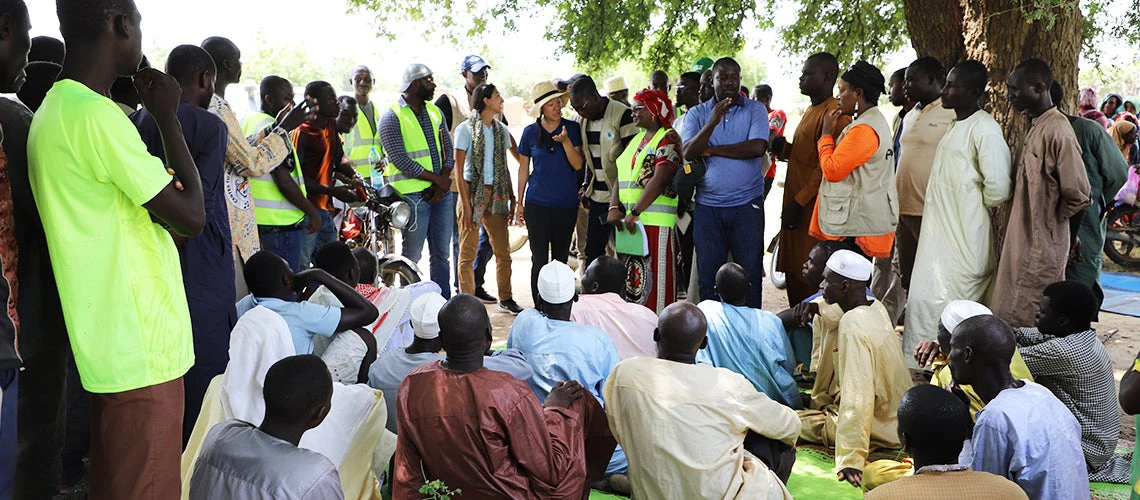 Building an effective bridge with civil society organizations in Cameroon
Building an effective bridge with civil society organizations in Cameroon
Cameroon’s 56,000 civil society organizations (CSOs) play a crucial role in Cameroon’s development, working alongside and supporting the government's initiatives when needed in all ten regions. Particularly active in priority sectors such as climate change, social accountability, education, health, peacebuilding, and in project planning, implementation, and supervision, CSOs and faith-based organizations (FBOs) also promote awareness and well-being for the most vulnerable members of the community.
Active partners in Cameroon’s development agenda
The collaborative efforts between CSOs, non-state actors, government, and development partners are boosting Cameroon's development. With 18 national and four regional projects worth over $3.1 billion, the World Bank contributes significantly to these efforts. Recognizing the contributions of CSOs towards the country's progress, the Bank is committed to deepening its collaboration with these stakeholders to achieve shared development objectives.
A key factor in project efficiency
The goal is to promote social accountability by monitoring World Bank operations and ensuring the inclusion of marginalized groups such as young people, women, refugees, and internally displaced persons. The platforms aim to bolster CSO participation in development dialogues, acknowledging their invaluable contributions to the efficiency of projects.
Addressing CSOs’ Challenges
CSOs struggle with several challenges besides funding, including limited access to information and capacity-building opportunities. These components are pivotal in achieving their missions and contributing to the sustainable development goals of Cameroon.
Despite legal guarantees, accessing reliable information is an obstacle course for CSOs, especially in a context with a strong culture of suspicion towards them. Most Cameroonian CSOs operate at the grassroots level and often lack the necessary resources, training, or equipment for comprehensive community needs assessments or impact evaluations. The challenges are further compounded for CSOs operating in remote or crisis-affected areas, grappling with inadequate infrastructure, limited Internet connectivity, and lack of government representation.
Regional Platforms to empower CSOs
The regional platforms in Cameroon help CSOs unite, amplifying their impact and effectiveness. Two platforms encompass over 200 CSOs in the West and Adamawa regions. The WB-CSO platforms champion social accountability through citizen-led monitoring of public investment budgets and World Bank-funded projects. They also strengthen local governance and address development issues with a particular focus on climate change. By fostering collaboration between CSOs and central and local authorities, these platforms bolster CSOs’ voices, expanding their reach within the development discourse.

"The added value this platform brings to us are multiple: support, monitoring of CSOs’ activities on the ground, and empowerment." Marie Abe, FOSCAD (Ngaoundere: Adamawa region).
Walking the talk: introducing the Geo-Enabling initiative for Monitoring and Supervision
This collaboration aims to increase the involvement of CSOs in monitoring public investment budgets. Some of Cameroon’s investment projects are either poorly executed or incomplete, even though they have been approved or implemented on paper. To address this issue, the government, through the Ministry of Finance and the Ministry of Economy, Planning, and Regional Development, is fully committed to ensuring that CSOs participate in monitoring projects funded through public investment funds.
A short-term objective is to establish an interactive citizen platform using the Geo-Enabling initiative for Monitoring and Supervision (GEMS) methodology and enable civil society to provide real-time feedback on public investment implementation. Sourcing official data from the Ministry of Finance, the Ministry of Economy, Planning, and Regional Development, and other Government agencies, the platform will display information on public investment budget allocation towards local development and address climate change and its effects. The dynamic feedback mapping system will generate automated reports that citizens can easily access, also enabling them to be informed in real time.



Join the Conversation